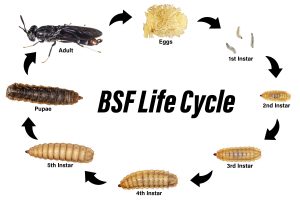Using insect larvae in skincare might seem unconventional, even off-putting. But the black soldier fly is proving to be a surprisingly potent ingredient in the world of cosmeceuticals. Researchers from Malaysia and Australia have unveiled the extraordinary potential of this insect to deliver powerful antimicrobial and antioxidant benefits to the skin.
Traditionally, insects have been underutilised despite their impressive adaptability and rich biochemical profiles. The black soldier fly, particularly, stands out for its nutrient-dense larvae, which exhibit antimicrobial, antioxidant, anti-inflammatory, and wound-healing properties. These attributes make it a unique candidate for therapeutic skincare applications.
“Insects are a vast, untapped resource,” explains Professor Dr. Goh Khang Wen, Pro Vice-Chancellor of Global Engagement at INTI International University and a key research team member. “Their unique biochemistry offers sustainable solutions across various industries, including skincare.”

Professor Dr. Goh Khang Wen is Pro Vice-Chancellor of Global Engagement at INTI International University and a key research team member.
Black soldier fly (BSF)–based skincare marks a significant departure from traditional formulations, which often rely on synthetic compounds. By harnessing natural bioactive compounds from BSF larvae, such as antimicrobial peptides and antioxidants, these products offer effective remedies for skin pathogens and oxidative damage. Moreover, they align with the rising demand for a sustainable and eco-friendly approach to personal care.

The life cycle of the black soldier fly, whose larvae are being explored for their antimicrobial and antioxidant benefits in skincare.
While widely trusted, conventional skincare products often contain synthetic ingredients that can irritate sensitive skin and contribute to environmental challenges during production. The overuse of antibiotics in these products has also worsened global antimicrobial resistance. In contrast, BSF farming promotes sustainability by requiring fewer resources and utilising organic waste as feed, creating a circular economy with minimal environmental impact. However, consumer acceptance poses a challenge, as does navigating the regulatory complexities of commercialising insect-based products.

Conventional skincare products often depend on synthetic ingredients, raising concerns about skin irritation and environmental impact.
Among the most exciting discoveries are the antimicrobial peptides found in BSF larvae. These molecules combat common bacteria and show potential against drug-resistant strains, even outperforming some traditional antibiotics in laboratory studies. Additionally, the larvae are rich in essential amino acids and fatty acids, including lauric acid, which has potent antimicrobial properties. Research also highlights how the larvae’s diet directly influences the potency of these bioactive compounds, paving the way for precision farming techniques.
Beyond its scientific potential, the black soldier fly represents a step forward in sustainability for the personal care sector. Researchers envision a future where waste management and cosmeceutical innovation are seamlessly integrated by leveraging the fly’s natural scavenging behaviour and its ability to thrive on organic waste.
Prof. Goh emphasised that while the findings are promising, additional research is required to develop these discoveries into market-ready products. “Collaboration between academia, industry, and policymakers will be crucial in ensuring that the black soldier fly’s potential is fully realised sustainably and ethically,” he stated.